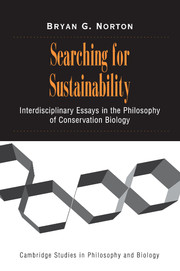Book contents
- Frontmatter
- Contents
- Searching for Sustainability
- General Introduction: An Interdisciplinary Experiment
- I PRAGMATISM AS AN ENVIRONMENTAL PHILOSOPHY
- 1 The Constancy of Leopold's Land Ethic
- 2 Thoreau and Leopold on Science and Values
- 3 Integration or Reduction: Two Approaches to Environmental Values
- 4 Convergence Corroborated: A Comment on Arne Naess on Wolf Policies
- 5 Pragmatism, Adaptive Management, and Sustainability
- II SCIENCE, POLICY, AND POLICY SCIENCE
- III ECONOMICS AND ENVIRONMENTAL SUSTAINABILITY
- IV SCALING SUSTAINABILITY: ECOLOGY AS IF HUMANS MATTERED
- V SOME ELEMENTS OF A PHILOSOPHY OF SUSTAINABLE LIVING
- VI VALUING SUSTAINABILITY: TOWARD A MORE COMPREHENSIVE APPROACH TO ENVIRONMENTAL EVALUATION
- Index
- References
2 - Thoreau and Leopold on Science and Values
Published online by Cambridge University Press: 21 January 2010
- Frontmatter
- Contents
- Searching for Sustainability
- General Introduction: An Interdisciplinary Experiment
- I PRAGMATISM AS AN ENVIRONMENTAL PHILOSOPHY
- 1 The Constancy of Leopold's Land Ethic
- 2 Thoreau and Leopold on Science and Values
- 3 Integration or Reduction: Two Approaches to Environmental Values
- 4 Convergence Corroborated: A Comment on Arne Naess on Wolf Policies
- 5 Pragmatism, Adaptive Management, and Sustainability
- II SCIENCE, POLICY, AND POLICY SCIENCE
- III ECONOMICS AND ENVIRONMENTAL SUSTAINABILITY
- IV SCALING SUSTAINABILITY: ECOLOGY AS IF HUMANS MATTERED
- V SOME ELEMENTS OF A PHILOSOPHY OF SUSTAINABLE LIVING
- VI VALUING SUSTAINABILITY: TOWARD A MORE COMPREHENSIVE APPROACH TO ENVIRONMENTAL EVALUATION
- Index
- References
Summary
When we ask, “What is the value of biodiversity?” we can expect that respondents, assuming that they answer the question at all, will answer in one of two quite different ways. Let us sketch these alternatives.
Some answers are mainly economic, emphasizing the actual and potential uses of living species. To this group, the value of biodiversity will be stated in quantifiable terms (Randall, 1988). This approach is utilitarian and anthropocentric. It measures value as contributions to human welfare. And it is “reductionistic” in the sense that it reduces to dollars all of the apparently disparate values and uses associated with wild species. Reductionists discuss the value of biodiversity by trying to put fair prices on its uses; they are most comfortable with the language of mainstream, neoclassical microeconomics. Natural objects, on this approach, are simply “resources” for human use and enjoyment. One characteristic of this approach, which makes it attractive in decision processes, is that it promises an aggregation of values: the contribution of nature to human welfare is made commensurable and interchangeable with other human benefits. This approach, therefore, holds open the possibility of a bottom-line figure that tells us what we should do in complex policy decisions; we should have exactly as much preservation of biodiversity as society is willing to pay for, given competing social needs.
- Type
- Chapter
- Information
- Searching for SustainabilityInterdisciplinary Essays in the Philosophy of Conservation Biology, pp. 30 - 46Publisher: Cambridge University PressPrint publication year: 2002



